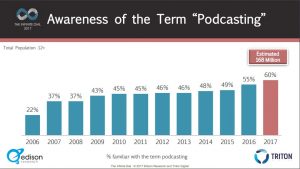Convince Your Organization to Let You Podcast
This document will not guarantee that the school, business or group you work or volunteer with will let you make a podcast, but hey – it’s worth a shot, right?
Why should you convince your organization to let you make a podcast?
Podcasts are an accessible form of media, growing in popularity. Edison Research reports that people spend an average of five hours and seven minutes per week listening to podcasts, with most people listening at home, in a vehicle, or while walking. Like radio, podcasting is an intimate format, providing a direct channel between speaker and listener.

A regular podcast can foster a relationship with an audience by providing them with high-quality content in a way that engages and entertains while they develop a positive connection with your brand. You may actually have more luck getting your audience to engage with a podcast than you will have getting them to read an article on a website.
A FEW ITEMS TO CONSIDER BEFORE YOU GET STARTED
Who is your audience?
In order to be successful, we will have to be very clear about who you are trying to reach with your podcast and why. Each audience will have different needs. Most audiences will want information that is relevant to their lives and interesting. Knowing who your audience is will be the MOST IMPORTANT thing to determine before you get started as it will inform the content and sound of your podcast.
For example, potential audiences for a Queen’s faculty podcast could include: Queen’s community, industry or discipline-specific listeners, Queen’s alumni or current students, potential students or parents of potential students, etc. Each of those groups will want to hear something different. Know who you want to speak to BEFORE you get going.
Can you find a niche?
In general, podcasts tend to do well when they specialize – the most specialized the content, the more likely a niche audience will be to seek it out. That said, good generalized information that is well-delivered will also have appeal.

What are your goals?
You will make a stronger case to your higher ups if you can clearly articulate what you want to achieve in creating a podcast, because “podcasts are cool” probably won’t cut it. These goals might include:
- Increasing brand recognition
- Raising profile for the organization / positioning your organization as ‘thought leaders’
- Educating, engaging or entertaining listeners
- Driving traffic to your events or website
- Recruiting students, staff or faculty to your faculty/events
- Engaging leaders, faculty or alumni as interview subjects/speakers … and more!
How frequently?
Your podcast will be most successful in building loyal listeners when it comes out on a regular and reliable schedule. Content should be prepared well in advance so that happens. Possible delivery schedules include: weekly, bi-monthly, monthly.

That said, you’ll need to be clear about how long you think it will take you to make the podcast and have a strategy for managing your time appropriately. If your podcast takes too much of your time away from your primary duties, it’s going to be a hard sell.
Who will host?
Podcasts are typically hosted by one or two people on a regular basis who have some connection to the content. A regular host(s) is preferred for continuity and for building a relationship with listeners and will play a big role in setting the tone of the podcast. Who will host yours, and why?
 This might be an opportunity to engage a faculty member or more senior person on your team who might make a great host (especially one with some name recognition). Flattery is a sure path to success!
This might be an opportunity to engage a faculty member or more senior person on your team who might make a great host (especially one with some name recognition). Flattery is a sure path to success!
What style or format do you want?
Best bet here is to listen to lots of podcasts and gather up examples that you think would suit your needs. When you are making your case, you may be speaking to people who are not familiar with podcasting. Have some examples ready to play, or be able to provide links in your pitch document. The chosen style/format for a podcast will very much depend on the needs of the audience.
 In general, humans like being told stories, and stories are well-suited to the intimacy of aural media. Podcasts generally vary in length from 10 minutes to an hour, with many coming in at between 20 and 30 minutes. Have some idea of what kind of podcast you’d like to create before you make your pitch.
In general, humans like being told stories, and stories are well-suited to the intimacy of aural media. Podcasts generally vary in length from 10 minutes to an hour, with many coming in at between 20 and 30 minutes. Have some idea of what kind of podcast you’d like to create before you make your pitch.
Other things you will need to consider:
- Podcast title and logo
- Theme music (copyright-free)
- Show description
- Title and description for each episode
- Somewhere to host the audio content (i.e. adequate server space) – talk to CFRC!
Once you have given all of the above careful consideration, you will be ready to make your pitch. Prepare a written document outlining how you would like to proceed, and then book a meeting with your supervisor to make your case. Remember, the more prepared you are/clear about what you having mind, the easier it will be for your supervisors to say YES! Also be mindful that you will want to be clear about how you will cover all of your existing duties if you take on creating a podcast on top of your existing job. Be prepared to speak to how you feel creating a podcast will help you to ENHANCE your current work or will help you build relationships with people in other parts of the faculty/university.
Good luck!
